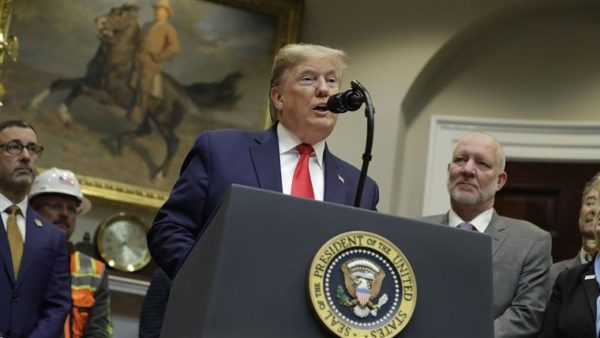WASHINGTON — How Americans, collectively, separate political fact from political fiction — and truth from misinformation — is broken.
And it’s hard to imagine how you fix it, including those of us in the news media who are trying to sort through the facts and fictions as best we can.
Consider yesterday’s developments, as the New York Times’ Peter Baker writes.
“An impeachment hearing on Capitol Hill presented radically competing versions of reality. An F.B.I. inspector general report punctured longstanding conspiracy theories even as it provided ammunition for others. And a trove of documents exposed years of government deception about the war in Afghanistan.”
Making matters worse, the attorney general of the United States, William Barr, condemned a Justice Department inspector general’s report that concluded the FBI’s probe into the 2016 Trump campaign and Russian interference was indeed justified.
And then U.S. Attorney John Durham, who’s leading the Trump administration’s look at the origins of the Russia investigation, added that he also didn’t agree with the IG report’s findings.
“Based on the evidence collected to date, and while our investigation is ongoing, last month we advised the inspector general that we do not agree with some of the report’s conclusions as to predication and how the FBI case was opened,” Durham said.
As NBC’s Ken Dilanian points out, it’s stunning that a U.S. attorney would issue a statement commenting on — and coming to a conclusion about — a pending, ongoing criminal investigation.
Our information system is sick.
And it all starts at the top.
After FBI Director Christopher Wray told ABC News that the 2016 Trump campaign was not unfairly targeted, President Trump attacked him via Twitter.
“I don’t know what report current Director of the FBI Christopher Wray was reading, but it sure wasn’t the one given to me. With that kind of attitude, he will never be able to fix the FBI, which is badly broken despite having some of the greatest men & women working there!”
But here’s what that IG report said:
“The decision to open the Crossfire Hurricane investigation was made by the FBI’s then Counterintelligence Division (CD) Assistant Director (AD), E.W. ‘Bill’ Priestap, and reflected a consensus reached after multiple days of discussions and meetings among senior FBI officials. We concluded that AD Priestap’s exercise of discretion in opening the investigation was in compliance with Department and FBI policies, and we did not find documentary or testimonial evidence that political bias or improper motivation influenced his decision.”
On the one hand, House Democrats are releasing articles of impeachment against the president of the United States.
And on the other hand, they’re about to give the same president a significant political victory – on the NAFTA 2.0 trade deal (when many of them opposed Barack Obama’s TPP deal).
It all underscores Democrats’ muddled impeachment message: How is Trump an existential threat to democracy and the 2020 election when you can cut a deal with him?
You either think someone is an existential threat or not.
That said, it’s clear that Speaker Nancy Pelosi and House Democrats believe the Trump trade deal is a proxy to show that centrist/pragmatic/at-risk House Democrats can be independent and work with Trump.
It might be smart politics.
Let our news meet your inbox. The news and stories that matters, delivered weekday mornings.
But it’s also not helpful to their impeachment argument.
Speaking of… Democrats plan to announce two articles of impeachment — abuse of power and obstruction of Congress — against President Donald Trump at a press conference later this morning, five sources told NBC News on Monday night.
House Judiciary Committee Democrats plan to meet at 8:00 am ET to review the articles ahead of the announcement, NBC’s Geoff Bennett adds.
Our question: Why just two articles? And not more?
Is this about Pelosi trying to keep almost the entire Dem caucus together on these two articles?
A day after Elizabeth Warren released the amount of money ($1.9 million) she received for her private legal work over the last 30 years, Pete Buttigieg’s campaign announced it would open its fundraisers to reporters and release the names of its bundlers, per NBC’s Priscilla Thompson and Vaughn Hillyard.
“A short while later, McKinsey and Company said in a statement to NBC News that it will allow the South Bend, Indiana, mayor to release the names of his clients from his time working at the worldwide consulting firm,” Thompson and Hillyard add.
“The announcements came after days of heightened scrutiny over Buttigieg’s closed door fundraisers and a nondisclosure agreement that has prevented him from naming which clients he worked for while at McKinsey from 2007-2010.”
Given all of the news out there — impeachment, the origins of the 2016 election, an looming trade deal — doesn’t this transparency battle seem … small?
Bernie Sanders stumps in Nevada… So does Elizabeth Warren, who holds a town hall in Reno… Andrew Yang embarks on a bus tour of Iowa… Julian Castro also is in the Hawkeye State… Tulsi Gabbard and Michael Bennet are in New Hampshire… And Tom Steyer and Deval Patrick spend their days in South Carolina.
While Tulsi Gabbard hasn’t qualified for this month’s Democratic debate, the congresswoman tweeted Monday night that even if she did, she wouldn’t go. NBC’s Julia Jester flagged the tweet for us: “For a number of reasons, I have decided not to attend the December 19th ‘debate’ — regardless of whether or not there are qualifying polls. I instead choose to spend that precious time directly meeting with and hearing from the people of New Hampshire and South Carolina.” Earlier in the day, Gabbard told reporters in New Hampshire that she’d continue her campaign regardless of making the debate stage and the DNC should “drop the arbitrary standards“ of how candidates qualify for the stage.
About 23 months.
That’s the length of time that passed between Dr. Ronny Jackson’s famously glowing assessment of President Donald Trump’s health in January 2018 and his formal decision yesterday to run for Congress in Texas.
Jackson, once a White House physician who extolled Trump’s “incredibly good genes,” was briefly tapped to head the Department of Veterans Affairs before the nomination was derailed by allegations of overprescribing prescription pills and drinking on the job.
Jackson now joins a crowded field in the race to replace retiring GOP Rep. Mac Thornberry in a heavily Republican congressional district.
Don’t miss the pod from yesterday, when we looked at one of the big reasons that public opinion about impeachment seems frozen.
Here’s our Hill team on what to expect from today’s announcement of two articles of impeachment.
Yesterday’s DOJ IG report found that the Russia investigation was justified — but it also highlighted major problems with how the FBI obtained a warrant to spy on a Trump campaign aide, Ken Dilanian writes.
It turns out that Ivanka Trump was apparently friends with Christopher Steele.
Pete Buttigieg will open his fundraisers to reporters and disclose the names of his clients at McKinsey.
A memo from a 1990s pollution case shows how Elizabeth Warren acted as a corporate consultant, according to the Washington Post.
The UK is heading into its Brexit elections. Here’s what to watch.
Ultimately, the GOP’s defense of Trump really boils down to this: Get over it.
Trump will meet with Russian foreign minister Sergei Lavrov today.
POLITICO profiles Rudy Giuliani’s spokeswoman.
Congress has reached an agreement on paid parental leave for federal employees.
Houston’s police chief had some harsh words for the state’s GOP senators.
Did the socialists of Jacobin magazine turn on Elizabeth Warren? POLITICO Magazine takes a look.
Mike Bloomberg has snagged his first major California endorsement.
Andy Beshear has been sworn in as governor.



